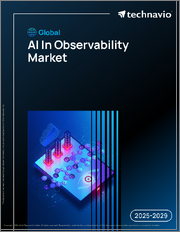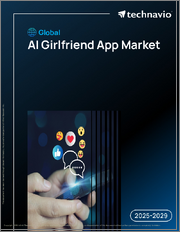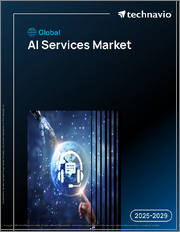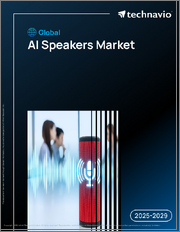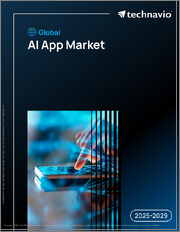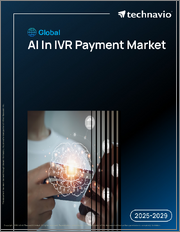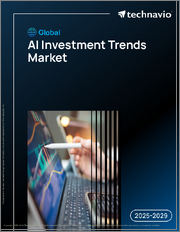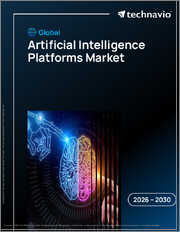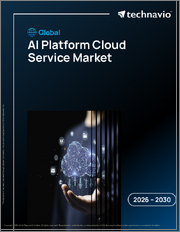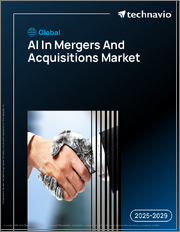
|
시장보고서
상품코드
1859829
AI 증강 개발 시장 예측(-2032년) : 컴포넌트별, 배포 방식별, 용도별, 최종사용자별, 지역별 분석AI-Augmented Development Market Forecasts to 2032 - Global Analysis By Component (Software and Services), Deployment Mode (Cloud-Based, On-Premises and Hybrid), Application, End User and By Geography |
||||||
Stratistics MRC에 따르면 세계의 AI 증강 개발 시장은 2025년에 9억 5,950만 달러를 차지하며 2032년에는 113억 3,680만 달러에 달할 것으로 예측되며, 예측 기간 중 CAGR은 42.3%로 성장할 전망입니다.
AI 증강 개발이란 소프트웨어 개발 수명주기에 인공지능 툴을 통합하여 생산성, 정확성, 속도를 높이는 것을 말합니다. 이러한 툴들은 코드 생성, 디버깅, 테스트, 문서화 등의 반복적인 작업을 자동화하여 개발자를 지원합니다. AI는 인간 개발자를 대체하는 것이 아니라 워크플로우를 간소화하고 실수를 줄이는 지능형 비서인 공동 파트너로서 역할을 합니다. GitHub Copilot, Amazon CodeWhisperer, ChatGPT와 같은 기술은 이러한 변화를 예시하는 것으로, 상황에 맞는 제안과 인사이트를 제공합니다. AI를 활용하면 팀은 개발 주기를 단축하고, 코드 품질을 향상시키며, 복잡한 문제 해결에 집중할 수 있습니다.
기업내 AI 툴 도입
AI 툴의 급속한 기업 도입은 AI 증강 개발 시장의 주요 촉진요인입니다. GitHub Copilot이나 Amazon CodeWhisperer와 같은 지능형 어시스턴트를 개발 워크플로우에 통합하여 생산성을 높이고 수작업을 줄이는 기업이 늘고 있습니다. 이러한 툴은 코딩, 디버깅, 문서화를 효율화하여 보다 빠른 납기와 소프트웨어 품질 향상을 가능하게 합니다. 기업이 확장 가능하고 효율적인 솔루션을 찾는 가운데, AI를 활용한 개발 플랫폼은 분야와 지역을 불문하고 시장 성장을 촉진하는 필수적인 요소로 자리 잡고 있습니다.
높은 도입 비용
이러한 변화의 가능성에도 불구하고 높은 도입 비용은 AI 증강 개발의 도입에 큰 걸림돌로 작용하고 있습니다. 기존 개발 환경에 AI 툴을 통합하려면 인프라, 교육, 커스터마이징에 많은 투자가 필요한 경우가 많습니다. 중소기업의 경우, 특히 ROI를 즉시 얻을 수 없는 경우, 선행 비용을 정당화하는 데 어려움을 겪을 수 있습니다. 또한 지속적인 유지보수 및 업데이트는 경제적 부담을 증가시킵니다. 이러한 비용 관련 문제는 특히 신흥 시장이나 예산이 제한된 조직에서 채택률을 둔화시킬 수 있습니다.
산업을 초월한 AI 활용 급증
각 산업 분야에서 AI 활용이 급증하는 것은 AI 증강 개발에 큰 기회가 될 것입니다. 금융, 제조업, 교육, 소매업에 이르기까지 각 업계는 AI를 도입해 업무를 최적화하고 사용자 경험을 개선하고 있습니다. 이러한 산업 전반 수요로 인해 다양한 이용 사례에 적응할 수 있는 지능형 개발 툴에 대한 필요성이 증가하고 있습니다. AI가 전략적 필수 요건이 되면서 AI 지원 코딩, 테스트 및 배포 솔루션 시장은 비약적으로 성장하고 있으며, 새로운 수입원과 혁신의 길을 열어줄 준비가 되어 있습니다.
데이터 프라이버시 및 거버넌스 문제
데이터 프라이버시 및 거버넌스 문제는 AI 증강 개발 시장의 성장을 크게 저해하고 있습니다. 개발자는 특히 AI 툴이 클라우드 기반 환경이나 대규모 데이터세트에 의존하는 경우, 민감한 데이터를 안전하게 관리해야 하는 문제에 직면하게 됩니다. 규제의 복잡성과 컴플라이언스 위반에 대한 두려움이 기업의 본격적인 도입을 가로막고 있습니다. 이러한 문제들은 도입에 마찰을 일으키고, 혁신을 지연시키며, 윤리적 문제를 제기하고, 궁극적으로 산업 전반에 걸쳐 AI 기반 개발 솔루션의 확장성과 신뢰성을 제한합니다.
COVID-19의 영향
COVID-19는 디지털 전환을 가속화하고, 간접적으로 시장을 활성화시켰습니다. 원격 근무와 분산된 팀은 자동화와 지능형 협업 툴에 대한 의존도가 높아졌습니다. 개발자들은 생산성을 유지하고 워크로드를 효율적으로 관리하기 위해 AI 어시스턴트에게 눈을 돌렸습니다. 초기 혼란은 IT 예산에 영향을 미쳤지만, 장기적으로는 탄력적인 기술 중심의 업무로 전환하여 AI 도입을 위한 비옥한 토양을 조성했습니다. 팬데믹 이후 민첩성과 혁신성이 강조되면서 AI 기반 개발 솔루션에 대한 수요가 지속적으로 증가하고 있습니다.
예측 기간 중 소프트웨어 부문이 가장 클 것으로 예측됩니다.
소프트웨어 분야는 AI 통합을 가능하게 하는 기초적인 역할을 하고 있으므로 예측 기간 중 가장 큰 시장 점유율을 차지할 것으로 예측됩니다. 소프트웨어 플랫폼은 지능형 코딩 어시스턴트, 자동 테스트 프레임워크, 실시간 디버깅 툴을 배포할 수 있는 유연한 환경을 제공합니다. 기업이 디지털 전환을 우선순위에 두면서 강력하고 확장 가능한 소프트웨어 솔루션에 대한 수요가 증가하고 있습니다. 개발 환경과 클라우드 기반 플랫폼의 지속적인 기술 혁신은 이 부문의 입지를 더욱 강화하며 AI 기반 생산성 향상의 핵심이 되고 있습니다.
예측 기간 중 의료 분야가 가장 높은 CAGR을 나타낼 것으로 예측됩니다.
지능형 진단, 개인화된 의료, 간소화된 임상 워크플로우에 대한 수요가 증가함에 따라 AI 툴은 의료 소프트웨어 개발에 혁명을 일으키고 있습니다. 개발자들은 AI를 활용하여 환자 치료와 데이터 관리를 지원하는 안전하고 컴플라이언스를 준수하며 효율적인 용도를 구축하고 있습니다. 이 분야의 복잡성과 규제 요구 사항으로 인해 AI의 강화는 특히 가치가 높으며, 의료 기술 솔루션의 빠른 채택과 혁신을 촉진하고 있습니다.
가장 큰 점유율을 차지하는 지역
예측 기간 중 아시아태평양은 강력한 기술 인프라, 정부 지원, 활발한 개발자 생태계로 인해 가장 큰 시장 점유율을 차지할 것으로 예측됩니다. 중국, 인도, 일본 등의 국가들은 AI 연구와 디지털 혁신에 많은 투자를 하고 있습니다. 제조업에서 핀테크에 이르기까지 이 지역의 다양한 산업은 소프트웨어 개발을 강화하기 위해 AI 툴을 도입하고 있습니다. 풍부한 인적 자원과 기업 도입이 활발한 아시아태평양은 AI 기반 혁신의 세계 허브로 부상하고 있습니다.
CAGR이 가장 높은 지역:
예측 기간 중 북미는 높은 수준의 연구개발, 강력한 벤처 캐피탈의 존재, 첨단 기술의 조기 도입으로 인해 가장 높은 CAGR을 보일 것으로 예측됩니다. 이 지역의 주요 기술 대기업과 스타트업들은 경쟁 우위를 확보하기 위해 AI를 개발 워크플로우에 통합하고 있습니다. 규제 명확화와 성숙한 디지털 생태계가 빠른 성장을 더욱 촉진하고 있습니다. 지능형 개발 툴에 대한 수요가 급증하는 가운데, 북미는 혁신과 시장 확대를 주도하고 있습니다.
무료 커스터마이징 서비스
이 보고서를 구독하는 고객은 다음과 같은 무료 맞춤화 옵션 중 하나를 이용할 수 있습니다.
- 기업 소개
- 추가 기업 종합 프로파일링(최대 3사)
- 주요 기업의 SWOT 분석(최대 3사)
- 지역 구분
- 고객의 관심에 따른 주요 국가별 시장 추정, 예측, CAGR(주: 타당성 확인에 따라 다름)
- 경쟁사 벤치마킹
- 제품 포트폴리오, 지역적 입지, 전략적 제휴를 기반으로 한 주요 기업 벤치마킹
목차
제1장 개요
제2장 서론
- 개요
- 이해관계자
- 분석 범위
- 분석 방법
- 데이터 마이닝
- 데이터 분석
- 데이터 검증
- 분석 어프로치
- 분석 자료
- 1차 조사 자료
- 2차 조사 자료
- 전제조건
제3장 시장 동향 분석
- 촉진요인
- 억제요인
- 시장 기회
- 위협
- 용도 분석
- 최종사용자 분석
- 신흥 시장
- 신형 코로나바이러스(COVID-19)의 영향
제4장 Porters Five Force 분석
- 공급업체의 교섭력
- 바이어의 교섭력
- 대체 제품의 위협
- 신규 참여 기업의 위협
- 기업간 경쟁
제5장 세계의 AI 증강 개발 시장 : 컴포넌트별
- 소프트웨어
- AI 기반 개발툴
- 통합 개발 환경(IDE)
- 코드 생성 툴
- 서비스
- 컨설팅
- 실장
- 지원·정비
제6장 세계의 AI 증강 개발 시장 : 배포 방식별
- 클라우드 기반
- 온프레미스
- 하이브리드
제7장 세계의 AI 증강 개발 시장 : 용도별
- 코드 생성·자동 보완
- 코드 리뷰, 테스트 자동화
- 버그 탐지·디버그
- 소프트웨어 개발을 위한 예측 분석
- 기타 용도
제8장 세계의 AI 증강 개발 시장 : 최종사용자별
- IT·통신
- 은행·금융 서비스·보험(BFSI)
- 의료
- 소매업·E-Commerce
- 제조업
- 자동차
- 정부·방위
- 기타 최종사용자
제9장 세계의 AI 증강 개발 시장 : 지역별
- 북미
- 미국
- 캐나다
- 멕시코
- 유럽
- 독일
- 영국
- 이탈리아
- 프랑스
- 스페인
- 기타 유럽
- 아시아태평양
- 일본
- 중국
- 인도
- 호주
- 뉴질랜드
- 한국
- 기타 아시아태평양
- 남미
- 아르헨티나
- 브라질
- 칠레
- 기타 남미
- 중동 및 아프리카
- 사우디아라비아
- 아랍에미리트
- 카타르
- 남아프리카공화국
- 기타 중동 및 아프리카
제10장 주요 동향
- 계약, 사업 제휴·협력, 합병사업
- 기업인수합병(M&A)
- 신제품 발매
- 사업 확장
- 기타 주요 전략
제11장 기업 개요
- Microsoft Corporation
- CircleCI, Inc.
- Google LLC
- Databricks, Inc.
- IBM Corporation
- ServiceNow, Inc.
- Amazon Web Services(AWS)
- SmartBear Software, Inc.
- OpenAI, L.L.C.
- SonarSource SA
- GitLab Inc.
- Tricentis GmbH
- Replit
- Snyk Ltd.
- Tabnine Ltd.
According to Stratistics MRC, the Global AI-Augmented Development Market is accounted for $959.5 million in 2025 and is expected to reach $11,336.8 million by 2032 growing at a CAGR of 42.3% during the forecast period. AI-Augmented Development refers to the integration of artificial intelligence tools into the software development lifecycle to enhance productivity, accuracy, and speed. These tools assist developers by automating repetitive tasks such as code generation, debugging, testing, and documentation. Rather than replacing human developers, AI acts as a collaborative partner-an intelligent assistant that streamlines workflows and reduces errors. Technologies like GitHub Copilot, Amazon CodeWhisperer, and ChatGPT exemplify this shift, offering context-aware suggestions and insights. By leveraging AI, teams can shorten development cycles, improve code quality, and focus on solving complex problems, making software creation more efficient and scalable.
Market Dynamics:
Driver:
Enterprise Adoption of AI Tools
The rapid enterprise adoption of AI tools is a key driver of the AI-Augmented Development market. Organizations are increasingly integrating intelligent assistants like GitHub Copilot and Amazon CodeWhisperer into their development workflows to boost productivity and reduce manual effort. These tools streamline coding, debugging, and documentation, enabling faster delivery and improved software quality. As businesses seek scalable and efficient solutions, AI-powered development platforms are becoming indispensable, fueling market growth across sectors and geographies.
Restraint:
High Implementation Costs
Despite its transformative potential, high implementation costs pose a significant restraint to AI-Augmented Development adoption. Integrating AI tools into existing development environments often requires substantial investment in infrastructure, training, and customization. Smaller enterprises may struggle to justify the upfront expenses, especially when ROI is not immediate. Additionally, ongoing maintenance and updates add to the financial burden. These cost-related challenges can slow down adoption rates, particularly in emerging markets or budget-constrained organizations.
Opportunity:
Surge in AI Applications Across Industries
The surge in AI applications across industries presents a major opportunity for AI-Augmented Development. From finance and manufacturing to education and retail, sectors are embracing AI to optimize operations and enhance user experiences. This cross-industry demand is driving the need for intelligent development tools that can adapt to diverse use cases. As AI becomes a strategic imperative, the market for AI-assisted coding, testing, and deployment solutions is poised for exponential growth, unlocking new revenue streams and innovation pathways.
Threat:
Data Privacy and Governance Concerns
Data privacy and governance concerns significantly hinder the growth of the AI-Augmented Development market. Developers face challenges in managing sensitive data securely, especially when AI tools rely on cloud-based environments and large datasets. Regulatory complexities and fear of non-compliance deter enterprises from full-scale adoption. These issues create friction in deployment, slow innovation, and raise ethical questions, ultimately limiting the scalability and trustworthiness of AI-driven development solutions across industries.
Covid-19 Impact
The Covid-19 pandemic accelerated digital transformation, indirectly boosting the market. Remote work and distributed teams increased reliance on automation and intelligent collaboration tools. Developers turned to AI assistants to maintain productivity and manage workloads efficiently. While initial disruptions affected IT budgets, the long-term shift toward resilient, tech-driven operations created fertile ground for AI adoption. Post-pandemic, the emphasis on agility and innovation continues to drive demand for AI-enhanced development solutions.
The software segment is expected to be the largest during the forecast period
The software segment is expected to account for the largest market share during the forecast period, due to its foundational role in enabling AI integration. Software platforms offer flexible environments for deploying intelligent coding assistants, automated testing frameworks, and real-time debugging tools. As enterprises prioritize digital transformation, demand for robust, scalable software solutions grows. Continuous innovation in development environments and cloud-based platforms further strengthens this segment's position, making it the cornerstone of AI-driven productivity enhancements.
The healthcare segment is expected to have the highest CAGR during the forecast period
Over the forecast period, the healthcare segment is predicted to witness the highest growth rate, due to rising demand for intelligent diagnostics, personalized medicine, and streamlined clinical workflows, AI tools are revolutionizing healthcare software development. Developers are leveraging AI to build secure, compliant, and efficient applications that support patient care and data management. The sector's complexity and regulatory demands make AI augmentation especially valuable, driving rapid adoption and innovation in health tech solutions.
Region with largest share:
During the forecast period, the Asia Pacific region is expected to hold the largest market share due to robust tech infrastructure, government support, and a thriving developer ecosystem. Countries like China, India, and Japan are investing heavily in AI research and digital transformation. The region's diverse industries-from manufacturing to fintech-are embracing AI tools to enhance software development. With a large talent pool and increasing enterprise adoption, Asia Pacific is emerging as a global hub for AI-driven innovation.
Region with highest CAGR:
Over the forecast period, the North America region is anticipated to exhibit the highest CAGR, owing to advanced R&D, strong venture capital presence, and early adoption of cutting-edge technologies. The region's tech giants and startups alike are integrating AI into development workflows to gain competitive advantage. Regulatory clarity and a mature digital ecosystem further support rapid growth. As demand for intelligent development tools surges, North America continues to lead in innovation and market expansion.
Key players in the market
Some of the key players profiled in the AI-Augmented Development Market include Microsoft Corporation, CircleCI, Inc., Google LLC, Databricks, Inc., IBM Corporation, ServiceNow, Inc., Amazon Web Services (AWS), SmartBear Software, Inc., OpenAI, L.L.C., SonarSource SA, GitLab Inc., Tricentis GmbH, Replit, Snyk Ltd. and Tabnine Ltd.
Key Developments:
In September 2025, Microsoft Fabric Community Conference (FabCon), Microsoft unveiled major upgrades to its Fabric platform, including new Graph and Maps capabilities. These enhancements support deeper AI readiness and data contextualization, enabling organizations to build smarter agents and applications.
In September 2025, Workday announced a strategic collaboration with Microsoft to integrate AI agents built using Microsoft Azure AI Foundry and Copilot Studio into Workday's Agent System of Record (ASOR). This partnership aims to streamline enterprise AI management by verifying agent identity and ensuring secure, context-aware operations across business systems.
Components Covered:
- Software
- Services
Deployment Modes Covered:
- Cloud-Based
- On-Premises
- Hybrid
Applications Covered:
- Code Generation & Auto-completion
- Code Review & Testing Automation
- Bug Detection & Debugging
- Predictive Analytics for Software Development
- Other Applications
End Users Covered:
- IT & Telecom
- Banking, Financial Services, and Insurance (BFSI)
- Healthcare
- Retail & E-commerce
- Manufacturing
- Automotive
- Government & Defense
- Other End Users
Regions Covered:
- North America
- US
- Canada
- Mexico
- Europe
- Germany
- UK
- Italy
- France
- Spain
- Rest of Europe
- Asia Pacific
- Japan
- China
- India
- Australia
- New Zealand
- South Korea
- Rest of Asia Pacific
- South America
- Argentina
- Brazil
- Chile
- Rest of South America
- Middle East & Africa
- Saudi Arabia
- UAE
- Qatar
- South Africa
- Rest of Middle East & Africa
What our report offers:
- Market share assessments for the regional and country-level segments
- Strategic recommendations for the new entrants
- Covers Market data for the years 2024, 2025, 2026, 2028, and 2032
- Market Trends (Drivers, Constraints, Opportunities, Threats, Challenges, Investment Opportunities, and recommendations)
- Strategic recommendations in key business segments based on the market estimations
- Competitive landscaping mapping the key common trends
- Company profiling with detailed strategies, financials, and recent developments
- Supply chain trends mapping the latest technological advancements
Free Customization Offerings:
All the customers of this report will be entitled to receive one of the following free customization options:
- Company Profiling
- Comprehensive profiling of additional market players (up to 3)
- SWOT Analysis of key players (up to 3)
- Regional Segmentation
- Market estimations, Forecasts and CAGR of any prominent country as per the client's interest (Note: Depends on feasibility check)
- Competitive Benchmarking
- Benchmarking of key players based on product portfolio, geographical presence, and strategic alliances
Table of Contents
1 Executive Summary
2 Preface
- 2.1 Abstract
- 2.2 Stake Holders
- 2.3 Research Scope
- 2.4 Research Methodology
- 2.4.1 Data Mining
- 2.4.2 Data Analysis
- 2.4.3 Data Validation
- 2.4.4 Research Approach
- 2.5 Research Sources
- 2.5.1 Primary Research Sources
- 2.5.2 Secondary Research Sources
- 2.5.3 Assumptions
3 Market Trend Analysis
- 3.1 Introduction
- 3.2 Drivers
- 3.3 Restraints
- 3.4 Opportunities
- 3.5 Threats
- 3.6 Application Analysis
- 3.7 End User Analysis
- 3.8 Emerging Markets
- 3.9 Impact of Covid-19
4 Porters Five Force Analysis
- 4.1 Bargaining power of suppliers
- 4.2 Bargaining power of buyers
- 4.3 Threat of substitutes
- 4.4 Threat of new entrants
- 4.5 Competitive rivalry
5 Global AI-Augmented Development Market, By Component
- 5.1 Introduction
- 5.2 Software
- 5.2.1 AI-Based Development Tools
- 5.2.2 Integrated Development Environments (IDEs)
- 5.2.3 Code Generation Tools
- 5.3 Services
- 5.3.1 Consulting
- 5.3.2 Implementation
- 5.3.3 Support & Maintenance
6 Global AI-Augmented Development Market, By Deployment Mode
- 6.1 Introduction
- 6.2 Cloud-Based
- 6.3 On-Premises
- 6.4 Hybrid
7 Global AI-Augmented Development Market, By Application
- 7.1 Introduction
- 7.2 Code Generation & Auto-completion
- 7.3 Code Review & Testing Automation
- 7.4 Bug Detection & Debugging
- 7.5 Predictive Analytics for Software Development
- 7.6 Other Applications
8 Global AI-Augmented Development Market, By End User
- 8.1 Introduction
- 8.2 IT & Telecom
- 8.3 Banking, Financial Services, and Insurance (BFSI)
- 8.4 Healthcare
- 8.5 Retail & E-commerce
- 8.6 Manufacturing
- 8.7 Automotive
- 8.8 Government & Defense
- 8.9 Other End Users
9 Global AI-Augmented Development Market, By Geography
- 9.1 Introduction
- 9.2 North America
- 9.2.1 US
- 9.2.2 Canada
- 9.2.3 Mexico
- 9.3 Europe
- 9.3.1 Germany
- 9.3.2 UK
- 9.3.3 Italy
- 9.3.4 France
- 9.3.5 Spain
- 9.3.6 Rest of Europe
- 9.4 Asia Pacific
- 9.4.1 Japan
- 9.4.2 China
- 9.4.3 India
- 9.4.4 Australia
- 9.4.5 New Zealand
- 9.4.6 South Korea
- 9.4.7 Rest of Asia Pacific
- 9.5 South America
- 9.5.1 Argentina
- 9.5.2 Brazil
- 9.5.3 Chile
- 9.5.4 Rest of South America
- 9.6 Middle East & Africa
- 9.6.1 Saudi Arabia
- 9.6.2 UAE
- 9.6.3 Qatar
- 9.6.4 South Africa
- 9.6.5 Rest of Middle East & Africa
10 Key Developments
- 10.1 Agreements, Partnerships, Collaborations and Joint Ventures
- 10.2 Acquisitions & Mergers
- 10.3 New Product Launch
- 10.4 Expansions
- 10.5 Other Key Strategies
11 Company Profiling
- 11.1 Microsoft Corporation
- 11.2 CircleCI, Inc.
- 11.3 Google LLC
- 11.4 Databricks, Inc.
- 11.5 IBM Corporation
- 11.6 ServiceNow, Inc.
- 11.7 Amazon Web Services (AWS)
- 11.8 SmartBear Software, Inc.
- 11.9 OpenAI, L.L.C.
- 11.10 SonarSource SA
- 11.11 GitLab Inc.
- 11.12 Tricentis GmbH
- 11.13 Replit
- 11.14 Snyk Ltd.
- 11.15 Tabnine Ltd.






